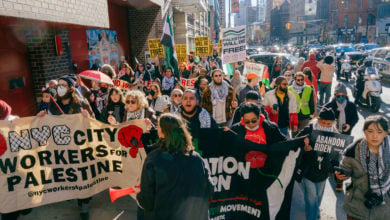An important lesson can be learned from the Senate’s initial failure on Dec. 11 to pass the $14 billion legislation for GM, Chrysler and Ford.
 |
The UAW leadership refused and the Republicans torpedoed the legislation.
Within hours, however, the sky did not fall. In fact, Bush and Cheney made it clear that they would re-introduce new legislation to subsidize the U.S. auto companies. If the UAW had agreed to destroy their own collective bargaining agreement, the government and the bosses would have been overjoyed. But this time they did not back down and the government went back to the drawing table. Union militants everywhere should utilize this lesson: there is another road open other than abject capitulation.
The UAW leadership has given one cutback after another to the auto bosses since president Ron Gettelfinger took office in 2002.
In 2002, 2005 and 2007 the UAW gave up health benefits and agreed to sweeping wage cuts. These concessions include two-tier pay levels so that newly hired workers are making under $14 per hour.
Now as profits and stock values plummet for GM, Chrysler and Ford, the ruling class has initiated a full-throttled campaign to blame “rich auto workers” for the crisis facing the companies. Politicians and the corporate media have demanded the auto workers’ union surrender every advance won through decades of organizing, picketing and strikes, including during the heroic era of the sit-down strikes in the mid-1930s.
The bosses are trying to turn public opinion against the workers and the union. All of labor needs to wage a counter-offensive to tell the truth.
The auto workers did not create this crisis. It was the bankers, corporate bosses and the capitalist system that have plunged working families into unemployment and deeper poverty by major cuts in wages, health care benefits and pensions.
It is not just in the Big Three unionized auto factories. The crisis in auto is global in character. Throughout Europe and around the world, the collapse in sales in the automobile markets has been deeper and faster than ever before.
In Germany, where auto production is the anchor of the country’s industrial production apparatus, the “automobile markets are plunging at an unprecedented speed,” according Matthias Wissmann, chairman of Germany’s Association of Automobile manufacturers.
From Spain to Belgium to Poland, car sales are plunging and factories are scaling back production.
The problem is not that workers are making too much money.
To the contrary, the issue is that the capitalist production is not centrally planned with the goal of meeting society’s needs for auto, trucks, rail cars and other vehicles. Rather, vehicle production is carried out by competing companies whose only goal is to make profits for the capitalist investors. When more vehicles are produced than can actually be sold at a profit for the owners, production goes into reverse: into a recession and depression.
This problem is unique to capitalism. It is a fatal flaw in the so-called “free market” system of private ownership.
If the price for cars was cut in half, for instance, all the unsold cars would be purchased and the factories could keep right on producing without any layoffs or wage cuts. Likewise, if there were a 50 percent cut in the interest rate charged by the banks to mortgage-paying homeowners, most foreclosures would be immediately prevented. But these measures that cut prices and allow production of autos or home-building to continue would seriously damage the rate of return, or profit, of the capitalist investors.
Instead of a rational solution, capitalism plunges workers into unemployment and cuts their wages, further diminishing their ability to pay for goods and services. This forces more factory closings and more layoffs.
Organized labor and all workers organizations will devise new strategies to fight back against the system-wide failure and bankruptcy. The 30-year long anti-labor offensive has weakened the union movement. But new strategies and tactics will be created to fight back. Workers’ control over industry and banks will be put on the agenda.
No country with this obscene economic system, which allows a few billionaire vultures to squander its vast resources while masquerading as the “captains” of industry, can escape the ravages of the current crisis.






